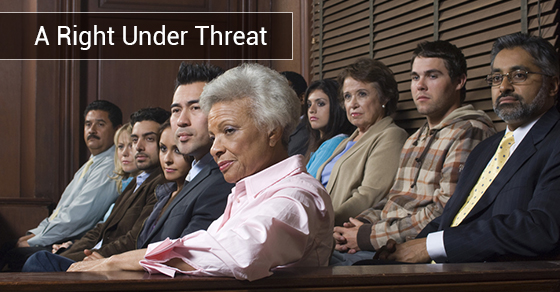A Jury of Your Peers: A Right Under Threat

After watching a jury for the past several weeks, and my client’s view of the people who would decide his fate, I decided to write about the importance of having a representative jury to decide cases.
For centuries, in western common law democracies like Canada, the US and the UK, a defendant in a serious criminal case has had the right to be tried by a jury. The principle behind this is that a jury of one’s peers- i.e. members of your community, will decide your fate based on the law, common sense, and their collective experience.
Jurors are ordinary people, and bring a fresh perspective to a case, where judges may sometimes be too cynical, tired or preoccupied with other matters to give your case the attention it deserves.
One important element of jury trials is the ability to have a small say over the composition of the jury that will decide the case. That procedure is known as the peremptory challenge, which allows each party (the defendant(s) and the Crown) to dismiss a potential juror without the need to provide a reason.
There are many reasons why a defendant might challenge a juror. It might be to seek a more balanced jury, in terms of the number of men and women; avoiding too many people with one type of job or age bracket, or yes, even ethnicity. Or it might be because you saw the potential juror wince at the charge you are facing, or give you a dirty look.
The reality is that there are not enough peremptory challenges (usually 12) to craft a jury entirely to the defendant’s liking, because the Crown also has peremptory challenges too (and sometimes more than you do). Any attempt to skew the composition of the jury one way or another will be met by opposition from the Crown.
However, when your fate is being decided by 12 randomly chosen people, any say that you can have in that process, including the ability to get rid of a few people you have a bad feeling about, provides you with a feeling of being part of the process. There are very few opportunities to meaningfully participate in the trial in court, because the lawyers are doing all the talking, so having a say can make a defendant feel more like part of the process. This is a key element in inspiring confidence in the administration of justice, and in providing some hope to the client, whose fate lies in the hands of the jury. Not being able to have a say over someone you feel is not impartial, or has pre-judged your case, will distract you during the whole trial, and undermine your confidence in the fairness of the process.
With Bill C-75, the government seeks to eliminate peremptory challenges from criminal cases, because of one case from Saskatchewan where the defendant and his lawyer used their challenges to eliminate aboriginal jurors. In seeking to sweep away centuries of precedent because of one case, the government is failing to consider that in most cases, peremptory challenges are used by minority defendants to try to get more minorities on the jury, not the other way around. There is no evidence that abusing the jury selection process is commonplace; in fact, the opposite seems to be true.
Getting rid of peremptory challenges is a mistake, part of the erosion of procedural protections for defendants against the power of the state. The government should focus on solutions to real problems such as delay and mandatory minimum sentences, instead of providing “solutions” to issues where there is no problem.

